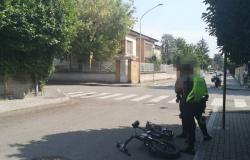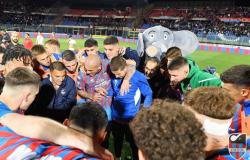
Another episode on the extraordinary documents on the history of Cremona from the declassified files of the American Command in Italy in 1945. This time we talk about how difficult the recovery in schools in May was. Censorship on books, the difficulties of canteens and finding suitable spaces. The salvation of the School of Violin Making depended on extra-budgetary financing of 200 thousand lire. The search is of Marco Bragazzi.
In the summer of 1945 the International School of Violin Making of Cremona had to resort to an extraordinary loan of 200,000 lire at the time to be able to cover the ordinary management costs that weighed on the world-famous institute. To obtain the funds necessary for the continuation of the activities foreseen by the structure, and to avoid an unmotivated and unacceptable closure of the gates, the director of the same, Prof. Umberto Canuto, was forced to ask the Allied Command to be able to access the funds made available by the Bank National Labor Party. The request made by Prof. Canuto to the Allied Command at the end of July 1945 had become necessary and urgent, the Allied Government had been in the city for two months but, within the various activities in which it was engaged, it had addressed those linked to the world of school with relative – and perhaps underestimated – attention. On 1 May 1945 the city of Cremona, according to the memories of some officials, lived in a strange immobility, the city had been liberated a few days before, the Allied Government had immediately gained a foothold in the centers of city management and, as expected with what had happened in the rest of Italy, he had begun to plan the work to be developed in the following months.
That first day of May formally returned to Labor Day after, during the twenty-year period, the traditional day of rest for workers had been moved to April 21st. The Cremonese school system was taken into consideration practically immediately after the arrival of the Allies in the city, the Government had set out the work to be carried out on the schools, little aware that many school buildings had been requisitioned for various reasons, concentrating, however, more on the path policy to be applied that not even on the return to normality of work in the classrooms. Several buildings had to return to their original purpose; for example, getting students back to Realdo Colombo, which since the autumn of 1943 had become the seat of the Court of Auditors of the Italian Social Republic, was not exactly a simple thing; registers, reports, top secret data and more had all remained in the folders inside the classrooms of the institute on the street of the same name, exposing students or staff to military secrets was certainly not something to be underestimated in terms of the secrecy of information.
The restoration of school activities was planned, in Cremona, according to the logic that, in May, the holidays for a large part of the students were now upon us, so even the daily needs for the functioning of an institute could be postponed. It was a gross error of evaluation on the part of the Allied Command, if in the areas of Italy liberated since July 1943 the processes of occupation and new use of many buildings had not had major temporal shocks in Cremona two years had passed with many of the schools engaged by other structures that had little to do with the study.
The first thing the Allied Government did in the city was to draw up a list of all the schools with the number of teachers present; whether public or private, the Allies had to have on the table the list of all personnel, a list which they would then analyze according to the parameters of the purge process. Some teachers and some people involved in school activities would have changed but, above all, the books would have changed, given that, with the end of the war, the tomes dedicated to study would have undergone the “process of de-fascism”, in practice on the desks the students would have progressively found new editions especially related to historical subjects. The study programs had not yet been updated so, more or less, the professors would have followed the existing programs to avoid the emergence of further problems that would have been added to those already present. A big problem to face for schools of all levels, excluding high schools, was that of the canteen service: with a chronic shortage of basic food products and an increase in widespread poverty, it became unfeasible to propose a service with high implementation costs, which would have led many families not to send their children to school.
To avoid a crescendo of absences in the classrooms, the Allied Government decided to organize the school canteen service according to a “limited” logic; instead of improving access to food availability by making at least one meal guaranteed and relieving families of a cover for their school-age children, the Allies, to maintain the lunches offered daily, asked families to make up for the shortages by cooking meals for schools . The problems of rotation in the school education path made themselves felt acutely during the summer of 1945 in Cremona, the financing for the International School of Violin Making, and other institutional realities, had to be provided as “out of budget” because the Allied Government it had not foreseen the ordinary administration costs for the higher institutes; However, it should be remembered that the Superintendent of Studies, in mid-August 1945, wrote to the Allied Command not guaranteeing the opening of the school year in September if the Allies had not made the seized premises completely available. In mid-August 1945, as many as five school structures were occupied or under seizure in the city which, in a few weeks, should have become accessible to students; to do so the Superintendent asked for a – perfectly acceptable – emergency intervention on the part of the Allied Government which finally made means and availability available to guarantee school continuity.
Tags: Cremona Sera documents released thousand lire open violin making school risk closing difficult school restart




